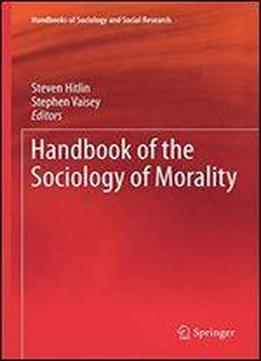
Handbook Of The Sociology Of Morality (handbooks Of Sociology And Social Research)
by Steven Hitlin /
2010 / English / PDF
6.8 MB Download
Human beings necessarily understand their social worlds in moral terms, orienting their lives, relationships, and activities around socially-produced notions of right and wrong. Morality is sociologically understood as more than simply helping or harming others it encompasses any way that individuals form understandings of what behaviors are better than others, what goals are most laudable, and what "proper" people believe, feel, and do. Morality involves the explicit and implicit sets of rules and shared understandings that keep human social groups intact. Morality includes both the "shoulds" and "should nots" of human activity, its proactive and inhibitive elements. At one time, sociologists were centrally concerned with morality, issues like social cohesion, values, the goals and norms that structure society, and the ways individuals get socialized to reproduce those concerns. In the last half-century, however, explicit interest in these topics has waned, and modern sociology has become uninterested in these matters and morality has become marginalized within the discipline. But a resurgence in the topic is happening in related disciplines psychology, neurology, philosophy, and anthropology - and in the wider national discourse. Sociology has much to offer, but is not fully engaged in this conversation. Many scholars work on areas that would fall under the umbrella of a sociology of morality but do not self-identify in such a manner, nor orient their efforts toward conceptualizing what we know, and should know, along these dimensions. The Handbook of the Sociology of Moralityfills a niche within sociology making explicit the shared concerns of scholars across the disciplines as they relate to an often-overlooked dimension of human social life. It is unique in social science as it would be the first systematic compilation of the wider social structural, cultural, cross-national, organizational, and interactional dimension of human moral (understood broadly) thought, feeling, and behavior.











